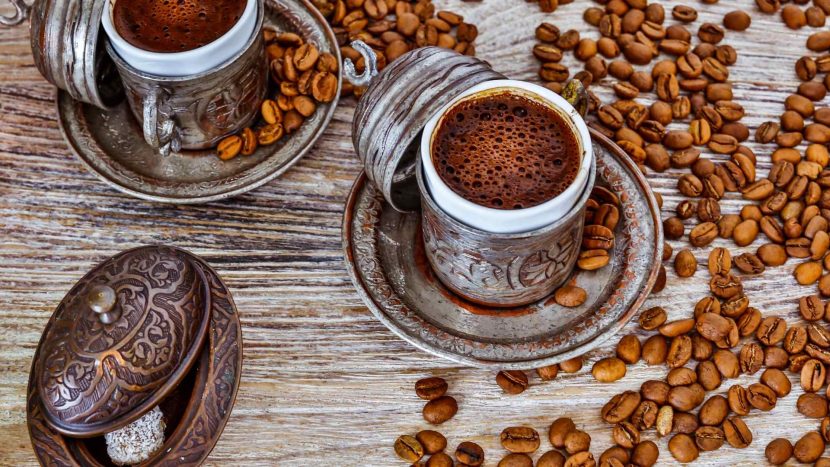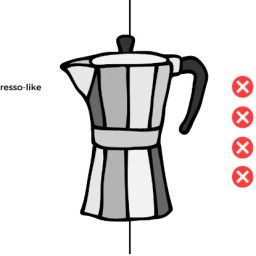
Turkish coffee isn’t just a drink; it’s a cultural heritage that transcends centuries, offering a glimpse into the rich traditions of Turkey. The preparation, serving, and enjoyment of this unique coffee are deeply entwined with Turkish history and social life. A key element often overlooked but central to the Turkish coffee experience is the size of the cup.
Far from arbitrary, the size of Turkish coffee cups plays a critical role in both the flavor concentration of the coffee and its ceremonial presentation. These cups, small but significant, are designed to enhance the coffee’s robust flavors and aromas, making every sip a deeply sensory experience.
Key Takeaways
- Importance of Cup Size in Tradition: The traditional Turkish coffee cup, or “fincan,” is not just a vessel for serving coffee; it’s a testament to a centuries-old tradition. The size of these cups ensures that the coffee is enjoyed as intended—strong, flavorful, and in small, savored sips.
- Variations and Impact on Taste: From the classic fincan holding 2.5 to 3 ounces of coffee to modern adaptations accommodating varying preferences, the size of the cup directly impacts the coffee’s taste. Smaller cups concentrate the flavor, offering a richer experience, while larger cups might be used for a milder brew.
- A Blend of Tradition and Modernity: Today’s Turkish coffee culture embraces both traditional and modern variations of the coffee cup. Whether you’re reaching for a meticulously designed porcelain fincan or a contemporary glass variant, each serves to bridge the past with the present, allowing enthusiasts to partake in a timeless ritual while catering to modern tastes.
The Traditional Turkish Coffee Cup (“Fincan”)
The heart of Turkish coffee’s charm lies in the traditional “fincan,” a small but mighty cup that holds about 2.5 to 3 ounces of this potent brew. These cups, typically made from porcelain or ceramic, are not just functional; they are crafted to complement the coffee’s intense flavor.
Their distinctive shape—narrow at the bottom and wider at the top—ensures the coffee cools slowly, allowing the drinker to savor each sip. Beyond just size and shape, the material of these cups also plays a crucial role in the coffee experience, retaining the perfect serving temperature and showcasing the coffee’s rich crema.
Modern Variations in Cup Sizes
As traditions evolve, so do the vessels that carry them. Modern adaptations of Turkish coffee cups range from 1.7 fluid ounces (50 milliliters) to sizes large enough for shared servings. These variations accommodate not just the solo connoisseur but also gatherings where coffee is a shared delight.
Today, you might find Turkish coffee served in everything from espresso cups, which blend modern convenience with traditional flavor, to larger mugs designed for those who prefer their brew slightly less intense. This range of sizes reflects a broader palette of coffee-drinking preferences and a nod to the diversity within Turkish coffee culture itself.
Symbolism and Tradition
Turkish coffee cups carry more than just coffee; they bear stories, traditions, and symbolism. The colors and designs adorning these cups are not mere decorations but narratives of history, culture, and personal expression. For instance, traditional colors like coral or Turkish red, navy blue, and bottle green don’t just add visual appeal; they convey messages of strength, power, and the peak periods of the Ottoman Empire.
These designs are a testament to the rich tapestry of Turkish history, inviting drinkers to not just enjoy a cup of coffee but to immerse themselves in a cultural experience.
The Art of Serving Turkish Coffee
Serving Turkish coffee is an art form, a ritual that transforms the act of drinking coffee into a ceremony of hospitality and connection. The choice of cup size and design is integral to this tradition, setting the stage for the coffee’s presentation. From the moment the finely ground coffee begins to simmer in the cezve to the careful pour into a beautifully crafted fincan, each step is executed with precision and care.
This ritual is not just about serving a beverage but about creating an experience—a moment of pause, of conversation and contemplation. It’s a demonstration of respect and a celebration of togetherness, wrapped up in the rich aroma and flavor of Turkish coffee.
Material and Design
When it comes to Turkish coffee cups, the material isn’t just a backdrop for design; it’s a critical element that enhances the coffee experience. Porcelain cups, with their refined and elegant look, not only add a touch of sophistication but also retain heat well, keeping your coffee warm for the perfect sip. Ceramic cups offer a more earthy aesthetic, with their material contributing to a steady temperature maintenance, ensuring that the coffee’s flavor is savored slowly.
Glass cups, on the other hand, are all about visual appeal, allowing you to admire the rich hues and layered textures of the brew. The choice between these materials affects not just the coffee’s temperature and flavor but also the mood and ambiance of your coffee ritual. Each material, with its unique properties and designs, invites you to enjoy Turkish coffee in a way that resonates with your personal style and preferences.
Size Matters: Finding the Perfect Fit
Choosing the right size for your Turkish coffee cup is like picking the perfect frame for a painting. It’s all about enhancing the beauty and intensity of the coffee. Traditional practices lean towards smaller sizes, typically between 2.5 to 3 ounces, concentrating the coffee’s rich flavors and aromas into each sip. This size is ideal for those who cherish the potent, full-bodied essence of Turkish coffee. However, modern preferences have introduced a range of sizes, allowing for a more tailored coffee experience.
Whether you’re drawn to the traditional small cups for their intensity or prefer a slightly larger size for a milder taste, the key is to find a balance that suits your flavor preferences and honors the ritualistic aspect of serving Turkish coffee. Remember, the size of the cup not only influences the coffee’s temperature and taste but also the pace at which you enjoy this cherished brew.
FAQs
Why does cup size matter for Turkish coffee?
The size of the cup is crucial because it determines the concentration and temperature of your coffee. Smaller cups, typically holding 2.5 to 3 ounces, are traditional for Turkish coffee, ensuring a rich, potent flavor with each sip. The ritual of Turkish coffee isn’t just about drinking; it’s about savoring, and the right cup size makes all the difference.
How can I find quality Turkish coffee cups online?
Finding quality cups online is easier than you might think. Look for retailers or artisan shops specializing in Turkish or Middle Eastern goods. Pay attention to reviews and descriptions to ensure you’re getting cups made from traditional materials like porcelain or ceramic, and consider the aesthetic appeal to match your personal style.
Is there a cultural significance to owning a set of Turkish coffee cups?
Absolutely! A set of Turkish coffee cups is not just about utility; it’s a nod to the rich tradition of Turkish coffee culture. Owning a set signifies a readiness to partake in and share this centuries-old ritual with others, emphasizing hospitality, warmth, and community. It’s about creating moments of connection over a meticulously prepared cup of coffee.
Final Thoughts
Choosing the right Turkish coffee cup is more than a practical decision; it’s a gateway to an authentic coffee experience. The size and material of your cup play significant roles in flavor, temperature, and the overall enjoyment of your coffee. But beyond these sensory aspects, your choice connects you to a tradition steeped in history, culture, and communal values. Each sip from a well-chosen cup is a reminder of the meticulous care that goes into preparing Turkish coffee and the warmth of sharing that experience with others.









